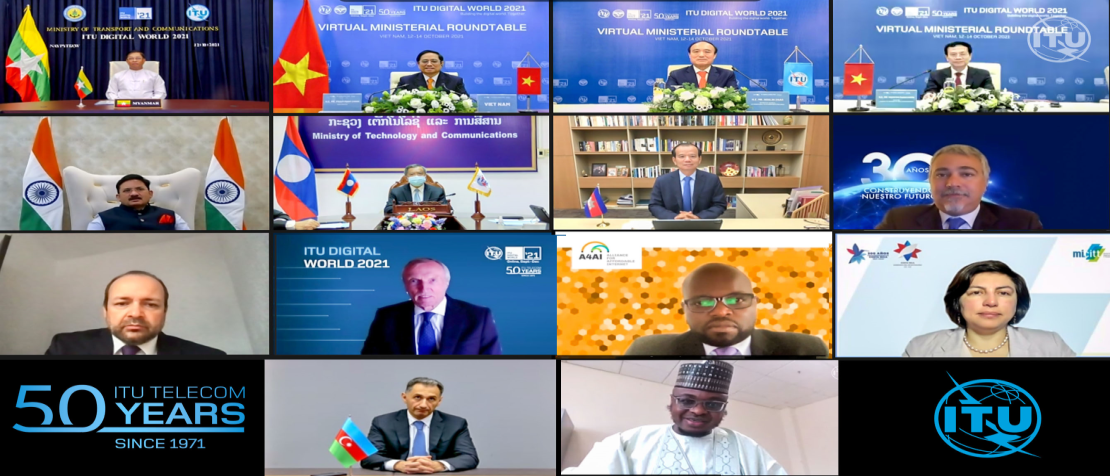


The opening of ITU Digital World 2021 a few days ago represents a special moment for the International Telecommunication Union (ITU).
This latest in our Telecom conference and exhibition series had us take stock of the incredible journey of information and communication technologies (ICTs) over the last 50 years. It was also a moment to turn to the future and commit to building the digital world, together.
My message to attendees - and the world - was to seize this moment to create a better digital future for all.
A special milestone
Fifty years ago, government and industry leaders from around the world met in Geneva for the first-ever ITU Telecom.
Over the last half-century, Telecom events have provided a window into an innovative industry at the heart of life-changing advances - from the Internet to the rise of wireless networks and emerging technologies like 5G, AI and others.
As the importance of small and medium-sized enterprises (SMEs) in the ICT ecosystem grew, Telecom events gave them a voice in the global debate and a platform to showcase their creativity. SMEs have become an integral part of these events since 2015.
When Nelson Mandela addressed Telecom '95, he noted the rift between the "information rich" and "information poor" and called for more international investment partnerships.
Bridging the pide between digital haves and have-nots remains central to ITU's work.
I hope we can now answer Mandela's call by strengthening public-private investments in ICTs in this crucial Decade of Action to achieve the United Nations Sustainable Development Goals by 2030.
Viet Nam's model
I was delighted to be in Ha Noi, Viet Nam, to open this year's ITU Digital World. Viet Nam's remarkable achievements in ICT development make it a great model for the region and the world. The country has engaged with African, Latin American and other Southeast Asian countries and made efforts to bring the cost of investments and services down.
Accelerating broadband infrastructure deployment, finding innovative ways to incentivize governments and industry, improving digital skills and affordability, and mitigating digital inequality are just some of the areas explored this week.
We were fortunate to have our first Ministerial Roundtable opened by the Minister of Information and Communications, Nguyen Manh Hung, and to have Prime Minister Pham Minh Chính share his views on affordability and the future of digital transformation.
Viet Nam has proven the right choice as host for ITU Digital World 2021. I thanked Prime Minister Chính for his support and the Vietnamese government for making this possible despite challenges posed by COVID-19.
Lowering costs for affordable access
For the half of the world that is connected, the digital future is already in motion. The critical role played by ICTs during the pandemic is proof of what is possible.
But the true measure of success will be when everyone has access to affordable ICTs and when the other half of the world is connected.
Getting the infrastructure in place - with the right policies to support it - is one of the main challenges.
We need to attract investors to places that are not always seen as profitable, as well as make the best use of limited investment resources.
In short, we need a new mindset and a new strategy.
Lack of infrastructure is not the only major impediment to connectivity. High costs, irrelevant content, and digital illiteracy also slow progress.
The ICT industry is often called on to roll out and maintain networks and services to underserved communities, as well as invest in new networks to support transformative technologies such as 5G. But how can the industry cut costs for consumers while making such heavy investments?
Affordable access is everybody's responsibility.
The ICT industry needs financial support and innovative approaches from government to incentivize investment and partnerships across the digital ecosystem. This means adopting new, flexible regulatory and policy frameworks that embrace collaborative participation.
The solution lies in the creation an investment-friendly environment, especially to connect rural and remote areas.
Digitizing daily life
Governments also have a major role to play in harnessing and driving demand for digital services. Local, relevant digital content must be widely available to bring more people online.
The more people use and benefit from ICTs, the greater the power of positive transformation.
Governments - together with the industry and other stakeholders - need to ensure that access and opportunity are equitably distributed. People of all ages, gender, backgrounds, capabilities, and income and literacy levels need to be able to engage with and be kept informed by their governments online. If not, we risk increasing digital inequalities between and within countries.
Building the digital world, together
ITU Digital World 2021 lasts until December. I invite public and private sector leaders to continue sharing their experiences and expectations.
This spirit of multilateral cooperation lies at the center of all ITU's events, activities and processes.
To say we are living in times of digital transformation is an understatement. ICTs have become vital to every aspect of our lives.
Together, we must strive to connect the unconnected by 2030.
Together, let us continue innovating to create a better digital world for all.
Based on Mr Zhao's remarks at the ITU Digital World opening ceremony on 12 October and Ministerial Roundtables on 12 and 14 October.
(Source: ITU)